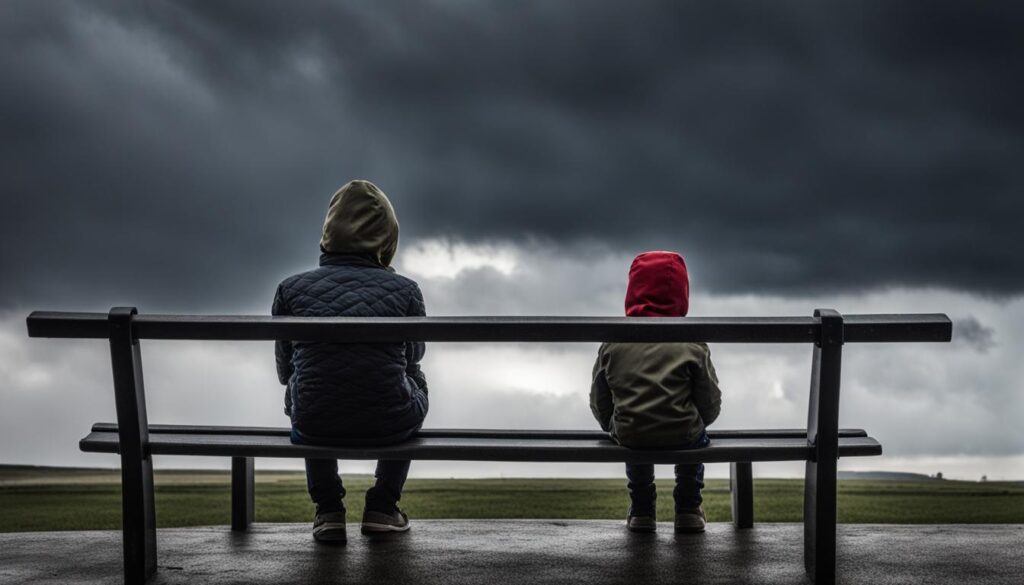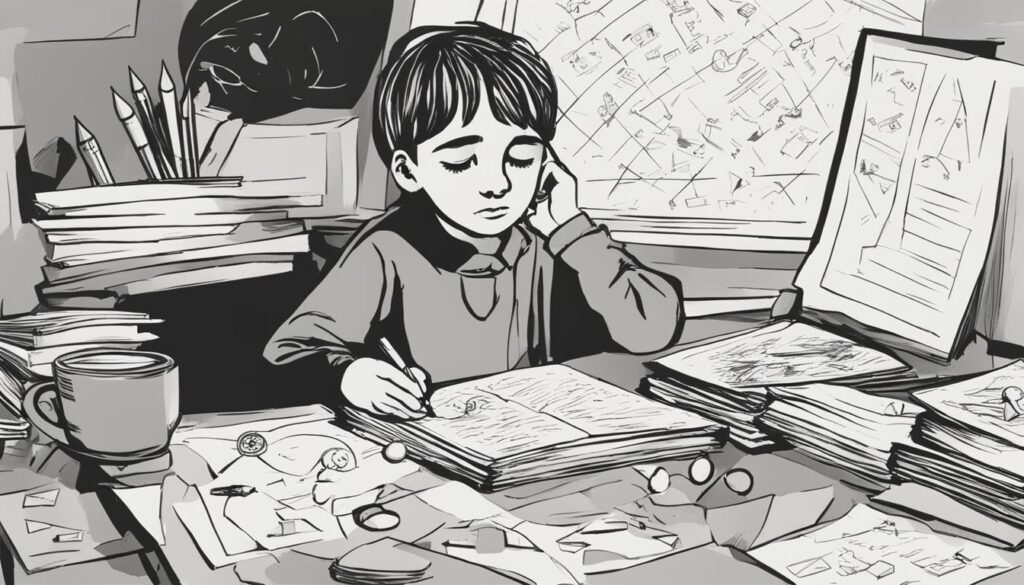Parenting can be challenging, especially when you start noticing changes in your child’s behavior. If you suspect that your child may be experiencing anxiety, it’s important not to ignore the signs. Recognizing the signs of anxiety in children is the first step towards getting them the help they need.
In this section, we have created a quiz to help you determine whether your child may be experiencing anxiety. This quiz is not intended to replace a professional assessment, but it can provide useful insights into your child’s potential anxiety symptoms. Take the test and find out whether your child might be struggling with anxiety.
Key Takeaways:
- Recognizing anxiety symptoms in children is vital for their well-being.
- The quiz in this section can help you gain insights into your child’s anxiety symptoms.
- Early intervention and support are crucial for children with anxiety.
- Professional assessment is necessary for an accurate diagnosis of anxiety in children.
- Don’t hesitate to seek the help of a professional if you suspect your child may have anxiety.
Understanding Child Anxiety
Child anxiety symptoms are not always easy to identify. However, as a parent, it’s important to recognize the signs and seek help early on. The good news is that anxiety assessment for kids is available, and professionals can accurately diagnose and treat child anxiety.
Common child anxiety symptoms include:
- Excessive worrying: Your child might worry too much about everyday activities, even if there is nothing to worry about.
- Irritability: Your child might become easily irritated or agitated, even by minor things.
- Avoidance: Your child might avoid certain activities or situations that make them anxious.
- Frequent headaches or stomachaches: Your child might experience physical symptoms due to anxiety.
There are various anxiety assessment techniques for kids, including questionnaires and clinical interviews. These assessments help professionals determine the extent of the child’s anxiety and develop a personalized treatment plan.
If you notice any of these child anxiety symptoms in your child, don’t hesitate to seek professional help. The sooner you address your child’s anxiety, the better their long-term prognosis.

Signs of Anxiety in Children
Recognizing anxiety in children can be tricky since anxiety symptoms can manifest in different ways. Keeping an eye out for certain signs, however, can help you identify whether your child may be struggling with anxiety.
Some common signs of anxiety in children include:
- Excessive worry: If your child worries excessively, even about minor things, this may be a sign of anxiety.
- Somatic symptoms: Children with anxiety may complain of stomach aches, headaches, and other physical symptoms even when there’s no underlying medical issue.
- Sleep problems: Anxiety can sometimes cause sleep difficulties and sleep disturbances.
- Frequent fears and phobias: Children with anxiety may be afraid of specific things or situations that other children their age find unremarkable.
If you suspect your child may be experiencing anxiety, it’s essential to take appropriate action. One way to assess your child’s anxiety levels is by using an anxiety questionnaire or anxiety test for a child.

By using an anxiety questionnaire for children, you can better understand your child’s anxiety levels and determine if further action is necessary. You can find such questionnaires online or get one from your child’s pediatrician or a mental health practitioner.
Next Steps and Conclusion
Now that you have a better understanding of child anxiety and have assessed your child’s symptoms, it’s important to take the next steps. The first step is to seek professional help from a qualified mental health provider who specializes in child anxiety assessment.
During the assessment, the mental health provider will use various tools and techniques to evaluate your child’s anxiety levels and determine the best course of treatment. This may include therapy, medication, or a combination of both.
It’s important to remember that seeking professional help is not a sign of weakness, but rather a proactive step towards helping your child manage their anxiety and improve their overall well-being.
There are many resources available to help you find a qualified mental health provider, such as your pediatrician or insurance provider. You can also search online for local therapists who specialize in child anxiety.
In conclusion, addressing child anxiety is crucial for their well-being and overall development. By taking proactive steps and seeking help from a qualified mental health provider, you can help your child manage their anxiety and thrive in their daily lives. Remember, you are not alone in this journey, and support is available.
FAQ
What are the signs of anxiety in children?
The signs of anxiety in children can vary, but common symptoms include excessive worry, restlessness, irritability, difficulty concentrating, sleep disturbances, and physical complaints like headaches or stomachaches. It’s important to note that each child may exhibit different signs, so it’s essential to pay attention to any behavior that seems out of the ordinary for your child.
How can I assess my child’s anxiety levels?
To assess your child’s anxiety levels, you can use an anxiety questionnaire specifically designed for children. These questionnaires consist of a series of questions that explore various anxiety symptoms. By answering the questions honestly and considering your child’s behavior and emotions, you can gain insight into their anxiety levels and determine if further evaluation is needed.
Is it normal for children to experience anxiety?
It is normal for children to experience some anxiety, especially in certain situations like starting school or participating in new activities. However, if your child’s anxiety significantly impacts their daily life, disrupts their functioning, or causes them distress, it may be more than typical childhood worries. It’s essential to seek professional guidance to determine the severity and appropriate treatment, if necessary.
What should I do if I suspect my child has anxiety?
If you suspect your child has anxiety, it’s important to consult with a healthcare professional, such as a pediatrician or child psychologist. They can conduct a thorough assessment, provide a diagnosis, and recommend appropriate treatment options. Additionally, creating a supportive and understanding environment at home, providing reassurance, and teaching coping skills can help your child manage their anxiety effectively.
Can anxiety in children be treated?
Yes, anxiety in children can be effectively treated. Treatment options for child anxiety often include a combination of therapy (such as cognitive-behavioral therapy) and, in some cases, medication. The exact treatment approach will vary depending on the severity of your child’s anxiety and their specific needs. Seeking professional help is crucial to develop an individualized treatment plan for your child.


